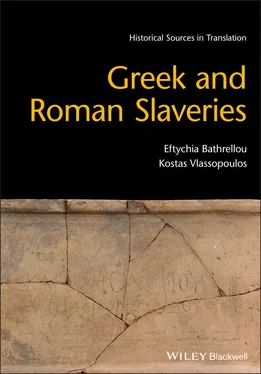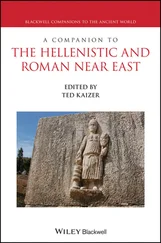1 ...8 9 10 12 13 14 ...19 2.9: Being struck by lightning will result in the manumission of those slaves who are not in a position of trust, but slaves who are trusted and honored by their masters or who own many possessions will lose the trust, the honor, and the possessions.
2.12: Seeing a tame lion wagging its tail and approaching harmlessly could be a good sign and bring benefits: to a soldier from his king, to an athlete from his bodily vigor, to a citizen from a magistrate, to a slave from his master. For the lion resembles them in power and strength.
3.28: A mouse signifies a slave. For mice too live with us, are fed on the same food as us, and are cowardly. It is therefore good to see many mice inside one’s house, especially if they are joyful and having fun. For they foretell much merriment and further acquisition of slaves.
4.30: Together with their other effects, slaves (in dreams) can also be references to the body of their masters. One who sees in his dream his slave suffering from fever will probably fall ill himself. For the relationship of the slave to the man who has the dream is analogous to that of the body to the soul.
With what other categories of people are slaves associated in each passage? Are they different or the same?
What conceptions of slavery are present in these various passages?
Are these various conceptions of slavery compatible with each other?
1.28 Herodotus, 4.1–4.4: Greek Historiography (Fifth Century BCE)
The fourth book of Herodotus is devoted to the Scythians, a major power in the north coast of the Black Sea. After reporting a Scythian expedition against the Medes in the Near East, Herodotus narrates the consequences of the long absence of the Scythians from home.
Literature: Harvey 1988; Hunt 1998: 42–52.
After 28 years away from their own land and upon their return home after such a long time, the Scythians were met by a task no less laborious than their war against the Medes, for they found a substantial army opposing them. To be more specific: the wives of the Scythians, as their husbands had been away from them for a long time, were having relations with the slaves. […] From these slaves and the Scythian wives, a generation of youths was reared, who, when they learnt of their origins, were opposed to the Scythians returning from the land of the Medes. First, they dug a wide trench, stretching from the Taurian mountains to lake Maiotis, at the point where it is broadest, and thus cut off the land. Then, when the Scythians attempted to invade, they camped opposite them and started fighting them. As they met in battle many times and the Scythians could not manage to gain the upper hand in this manner, one Scythian said the following: “What are we doing, Scythians? We are fighting against our own slaves, so we get killed and thus become fewer, and we kill them and will thus rule over fewer men in the future. Therefore, I think that we should now leave aside spears and bows, and each one should take his horse whip and draw near them. Until now, they have seen us bearing arms and thought of themselves as the same as us and of the same origin. But when they see us bearing whips rather than arms, they will learn that they are our slaves. When they realize this, they will not stand their ground.” The Scythians heard this and proceeded to do it. The others, shocked at what was going on, forgot the battle and started to flee. This then is how the Scythians ruled over Asia and, when driven out again by the Medes, it was by such means that they returned to their own land.
How did the Scythians overcome the resistance of the sons of their slaves?
Did the children of the Scythian women and the Scythian slaves grow up as slaves?
If not, why did the stratagem of the Scythians work on these young men, according to the passage? What does this imply about how masters thought of slaves?
What conception of slavery is evident in this passage? Cf. 1.1.
1.29 Xenophon, Memorabilia , 1.3.10–11: Greek Collection of Socratic Conversations (First Half of Fourth Century BCE)
Socrates is commenting on the behavior of Kritoboulos, son of his friend Kriton of Alopeke.
Literature: Brock 2007; Vlassopoulos 2011a.
“You should now consider Kritoboulos a most reckless man, capable of anything; he would do a somersault into a ring of knives or jump into fire.”
“What did you see him do,” Xenophon said, “that makes you condemn him like that?”
“Didn’t he dare,” Socrates said, “to kiss Alcibiades’ son, who is extremely beautiful and exactly in the bloom of youth?”
“Well, if such is his reckless deed,” Xenophon said “I think that I too would endure this danger!”
“Wretched man,” Socrates said. “What do you think would happen to you if you kissed someone beautiful? Wouldn’t you immediately become slave, from free, and waste much in harmful pleasures and have no time to pursue beautiful and honorable things but be forced instead to concern yourself with things you wouldn’t care for even if mad?”
How is slavery understood in this passage?
Should we dismiss this use of slavery as metaphorical and, hence, historically insignificant?
1.30 Dio Chrysostom, Oration 15 (Excerpted): 25Greek Epideictic Oratory (Late First/Early Second Century CE)
Literature: Panzeri 2011.
As it happens, I was present lately when two men had a dispute over slavery and freedom. […] The one man, finding his arguments outmatched and himself at a loss, turned to abuse, as often happens in such cases, and taunted the other with not being a free man. The taunted man very gently smiled and said: “My good man, how can one tell who is a slave and who is a free man?”
The first man said: “By Zeus, I do know, of course, that I and all these here are free men, while you have nothing to do with freedom.” […]
The other stood up and […] asked him how he knew this about the two of them. The first man said: “Because I know that my father is an Athenian, if anyone is, while yours is a slave of so and so,” mentioning his name. […] “And I also know that your mother is a fellow-slave of your father.” […]
The other responded: “Come now, by the gods, if I do agree with you that my parents are such as you say, how can you know about their slavery? Did you also have precise knowledge of their parents and are prepared to swear that they were both born to slave people and that so were those before them and everyone from the beginning of the line? For, clearly, if there has been one free man among a kin-group, it is no longer possible rightly to consider his descendants as slaves. It is impossible, my good man, that any kin-group existing from all eternity, as they say, does not have countless members who have been free and no fewer who have been slaves.” […]
The first man responded: “Let us then leave aside arguments related to one’s kin-group and ancestors, since you consider these so difficult to determine.” […]
And the other said: “But, in the name of the gods, what actions and experiences of mine do you know of, that make you say you know I am a slave?”
“I know that you are kept by your master, that you attend him and do whatever he orders you to do, and that you take a beating if you don’t obey.”
“But you thus also make sons their fathers’ slaves,” the other said, “for poor sons often attend their fathers and walk with them to the gymnasium or to dinner; also, they are all kept by their fathers, often take beatings from them and do whatever their fathers command them to do. Moreover, on the basis of showing obedience and taking a beating, you can go on and claim that a school-master’s pupils are his slaves and that gymnastic trainers or any other teachers are their pupils’ masters. For they too give orders and beat those who disobey.”
Читать дальше












